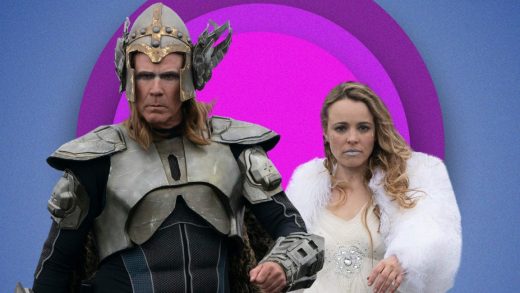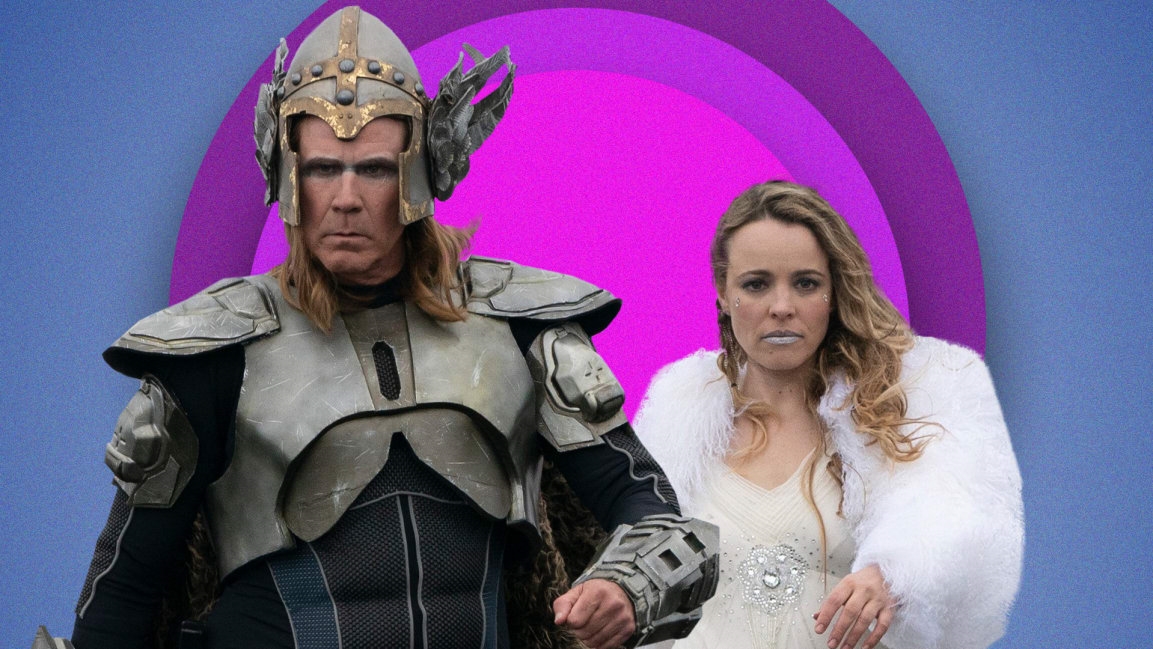Why the wild songs in Will Ferrell’s Netflix movie ‘Eurovision’ sound so real
It’s an annual televised extravaganza with nearly double the audience of the Super Bowl.
It’s an elaborate, exhaustive musical talent search that launched both ABBA and Celine Dion into global superstardom.
Yet relatively few Americans have even heard of Eurovision.
That’s all about to change, though, with the release of Will Ferrell’s new Netflix movie, Eurovision Song Contest: The Story of Fire Saga, a loving comedic tribute that captures the event’s essence by getting the music pitch perfect.
Director David Dobkin (Wedding Crashers, The Judge) was among the many Americans still in the dark when his agent first sent over the screenplay. He wasn’t even interested in having a look until the agent mentioned Will Ferrell had cowritten the project and would be playing one of the leads. When Dobkin finally did read the screenplay, he was hooked.
But only after asking whether it was possible to change the “horrible title” of the movie did he finally learn that Eurovision was a real thing.
“I had to watch hours of it to understand what I was looking at as I slowly fell in love with it,” the director says over the phone.
Questionable title aside—why is “vision” prioritized in a song contest?—the event is hard not to fall in love with. Eurovision has been going on every year since 1956, a musical spectacular that straddles the line between kitsch and sincerity, frequently tipping over fully in either direction. Musicians from every corner of the world vie to represent their country in the contest, with the winner receiving international bragging rights and an invitation for their country to host the following year’s festivities.
The idea for a Eurovision movie came from Ferrell, who has spent summers with his family in Sweden for the past 20 years—and never misses Eurovision. In the film, Ferrell plays Lars Erickssong, an Icelandic goofball who has always dreamed of winning the contest, as part of the duo Fire Saga, with childhood friend Sigrit Ericksdottir (Rachel McAdams).
Eurovision follows the year Fire Saga finally does enter the competition, at which point you better believe shenanigans ensue. It’s a film that couldn’t possibly work . . . unless the songs were on point.
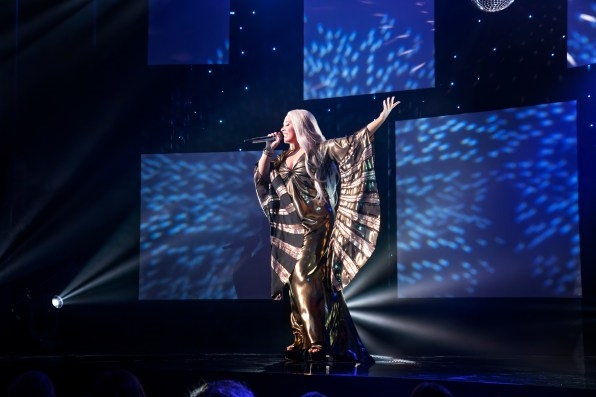
Rather than make savage fun of Eurovision—and its 182 million annual viewers by proxy—Dobkin wanted to make sure he accurately captured it. The songs in the film are authentically hummable, frequently synth-accented, poppy earworms of every genre.
“You can’t out-Eurovision Eurovision,” the director says. “I didn’t want to make a parody. I didn’t want it to be ‘Dick in a Box.’ I wanted the songs to be humorous, but I wanted them to be legit.”
The road to legitimacy, as it turned out, was paved with ringers. Dobkin brought on board Savan Kotecha, the songwriter and producer behind some of Ariana Grande’s biggest hits, along with legendary hitmaker Max Martin and some other Swedish svengalis, many of whom have secretly written songs for Eurovision at different points in their careers.
Together, the power team translated the ideas that Ferrell and cowriter Andrew Steele (Saturday Night Live) placed in the page into audio dynamite. Some of the songs were easy to build from Ferrell’s descriptions; others had to be shelved. The Dutch rockabilly group in the screenplay never materialized in any satisfactory way, for instance, and the idea for a tambourine army had to go, due to a rule about no more than five people accompanying the performer on stage.
The songs that did make it into the film, however, are fun, funny, barely heightened bubble gum for the brain. Here are some of the stories behind some of them, and the real contestants that inspired others.
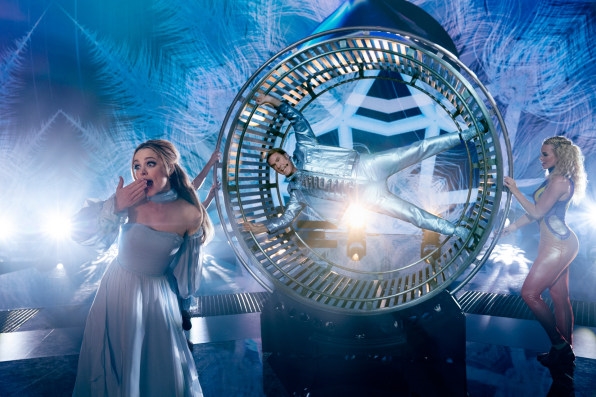
[Photo: John Wilson/Netflix]
“Double Trouble”
The song that Fire Saga selects to audition for Eurovision is actually the song that producer Savan Kotecha used to audition for working on the film. (Kotecha later claimed that if Dobkin and co. hadn’t used the song in the movie, he was going to rework it and give it to someone like Ariana Grande.)
In order to make the big scene where Fire Saga performs “Double Trouble” at Eurovision feel real, the director needed to shoot footage at the 2019 edition of the contest in Tel Aviv. It was the only way he could ever assemble such an enormous crowd without a vast budget or digital trickery. The director brought three cameras and three splinter crews to the contest and captured all the necessary wide shots of the crowd. Additionally, the director had Ferrell and McAdams “perform” as Fire Saga, to capture footage of the song with the crowd reacting.
“I had the vocals and the melodies reworked so that they were fake,” Dobkin recalls. “They weren’t exactly what we were doing, even though the time signature and the music was the same, because I didn’t want anyone recording on an iPhone and then putting it out, like, this week. The crowd went nuts, though, and that’s what’s in the movie.”
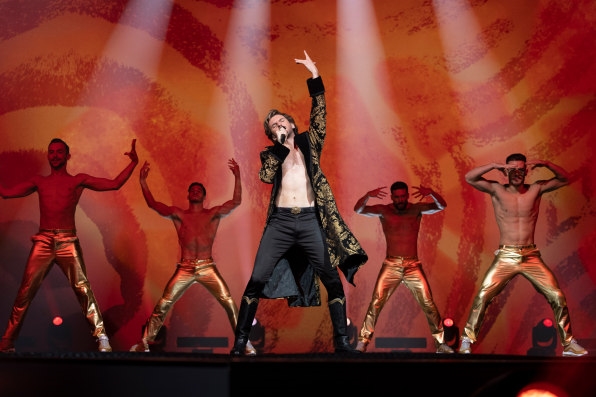
[Photo: John Wilson/Netflix]
“Lion of Love”
The only other song Dobkin filmed during his weeklong trip to Tel Aviv is the song by Fire Saga’s Russian rival, Alexander Lemtov (Dan Stevens), which is called “Lion of Love.”
“The character of Lemtov was very clearly described in the screenplay. It was a riff on this guy, Philipp Kirkorov,” Dobkin says. “The idea of this guy being like an opera singer came out of left field. I had used the word ‘operatic’ to describe the opening solo a capella vocal to Sav [Kotecha]. The next thing I knew, he came in with ‘Lion of Love,’ and it was genius. I think we gave one note about how I wanted him to hit a falsetto in the second verse, but the rest of the song is the song.”
“Running with the Wolves”
Late in the film, there’s an upbeat number by a band decked out in Gwar gear, but accompanied by a woman with enchanting vocals. If it seems too weird to be true, though, it’s not. “That was an homage to this Finnish band named Lordi that won Eurovision in 2006,” Dobkin says. “They are probably the most outrageous act to get all the way to the finals and win. I just love that that’s somewhere Eurovision goes. That song was something Sav [Kotecha] brought in, and we shaped the visuals around it.”
“Come and Play (Masquerade)”
Greece’s Mita Xenakis (Melissanthi Mahut) takes the stage to perform her song while dressed in an astronaut suit. She is later joined by backup dancers who have what looks like mega exercise balls covering their heads. The astronaut suit idea was inspired by the band Who See from Montenegro, who performed at Eurovision in 2013. But the rest of Mita’s bonkers performance had some outside influence.
“I kept going back to my favorite clips,” Dobkin says. “I have a huge wall of stills with my favorite acts from Eurovision, and the spacesuits were on it. And then my graphics designer on the movie created this weird Avatar, tree-of-life thing. The ideas are all an amalgam of craziness, and it’s my job to kind of organize them into something that seems to make sense. My choreographer sent me a video from Vegas, while she was designing something there. She was like, ‘Look at these girls who dance with balloons on their heads.’ My immediate response was yeah. The answer is yes. We’ll figure out how we do that somewhere in the movie.”
Fast Company , Read Full Story
(66)

